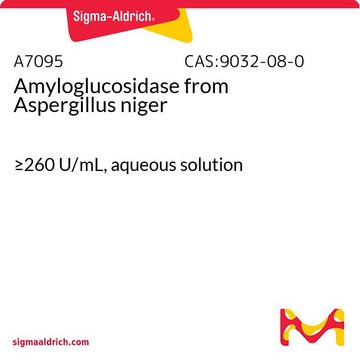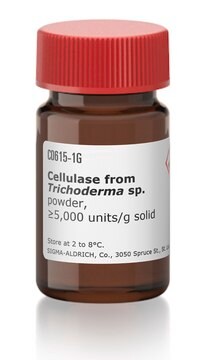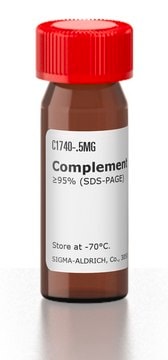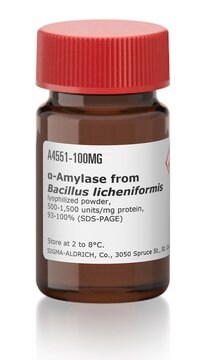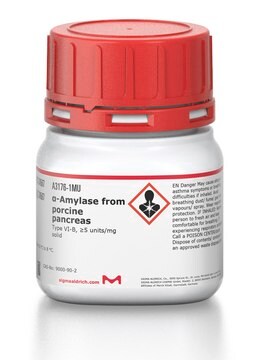I4753
Invertase from Candida utilis
Grade X, ≥300 units/mg solid
Synonym(s):
β-D-Fructofuranoside fructohydrolase, β-Fructofuranosidase, Saccharase
Sign Into View Organizational & Contract Pricing
All Photos(6)
About This Item
Recommended Products
type
Grade X
form
solid
specific activity
≥300 units/mg solid
mol wt
~260 kDa
foreign activity
α-galactosidase (melibiase), essentially free
storage temp.
−20°C
General description
Invertase from Candida utilis is secreted in the periplasm. The molecular weight of invertase from C. utilis is 300 kDa. It is a dimer of identical subunits. It is a N-glycosylated protein, rich in mannose oligosaccharide in its structure. The invertase encoding gene of C. utilis shares high homology with SUC2 gene of Saccharomyces cerevisiae.
Application
Invertase from Candida utilis has been used:
- as a supplement in YE liquid medium to observe for morphological changes in Streptomyces sp.
- to determine the sucrose content in ethanolic extract of leaf tissues
- to determine the total non-structural carbohydrates (TNC) in root tissues
This enzyme is useful for enzymatic determination of saccharose and for the structure investigation of carbohydrates containing β-D-fructofuranoside residue.
Biochem/physiol Actions
Invertase acts on sucrose and cleaves it into glucose and fructose. It is used in the preparation of invert syrup with equimolar concentration of fructose and sucrose. It finds its applications in confectionaries and in the production of alcoholic beverages, glycerol and lactic acid. Invertase is also used in the preparation of artificial honey, plasticizers for cosmetic industries.
Physical properties
Michaelis constant : 1.5x10 -2M (Saccharose)
Structure : Glycoprotein containing ca. 50% of carbohydrates
Optimum pH : 3.5 - 4.0 Optimum temperature : 60 - 70oC
pH Stability : pH 4.0 - 6.0 (50oC, 10min)
Thermal stability : below 60oC (pH 4.5, 10min)
Substrate specificity : The enzyme hydrolyzes saccharose and raffinose, but does not
hydrolyze inulin and melezitose.6)
Structure : Glycoprotein containing ca. 50% of carbohydrates
Optimum pH : 3.5 - 4.0 Optimum temperature : 60 - 70oC
pH Stability : pH 4.0 - 6.0 (50oC, 10min)
Thermal stability : below 60oC (pH 4.5, 10min)
Substrate specificity : The enzyme hydrolyzes saccharose and raffinose, but does not
hydrolyze inulin and melezitose.6)
Unit Definition
One unit will hydrolyze 1.0 μmole of sucrose to invert sugar per min at pH 4.5 at 55°C.
Preparation Note
Chromatographically purified
Signal Word
Danger
Hazard Statements
Precautionary Statements
Hazard Classifications
Resp. Sens. 1
Storage Class Code
10 - Combustible liquids
WGK
WGK 3
Personal Protective Equipment
dust mask type N95 (US), Eyeshields, Gloves
Certificates of Analysis (COA)
Search for Certificates of Analysis (COA) by entering the products Lot/Batch Number. Lot and Batch Numbers can be found on a product’s label following the words ‘Lot’ or ‘Batch’.
Already Own This Product?
Find documentation for the products that you have recently purchased in the Document Library.
Customers Also Viewed
Interactive effects of elevated carbon dioxide and growth temperature on photosynthesis in cotton leaves
Reddy AR, et al.
Plant Growth Regulation, 26(1), 33-40 (1998)
Purification and characterization of an invertase from Candida utilis: comparison with natural and recombinant yeast invertases
Chavez FP, et al.
Journal of Biotechnology, 53(1), 67-74 (1997)
Winter foot and equipment traffic impacts on a `L93?creeping bentgrass putting green
Baldwin CM, et al.
Hortscience: a Publication of the American Society For Horticultural Science Hortscience, 43(3), 922-926 (2008)
Invertase and its applications-a brief review
Kulshrestha S, et al.
Journal of Pharmacy Research, 7(9), 792-797 (2013)
Morphological and physiological changes in Streptomyces lividans induced by different yeasts
Santamaria R, et al.
Archives of Microbiology, 177(3), 259-266 (2002)
Protocols
Assay Procedure for Invertase
Our team of scientists has experience in all areas of research including Life Science, Material Science, Chemical Synthesis, Chromatography, Analytical and many others.
Contact Technical Service



